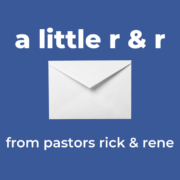a little r & r

While René and I will be on vacation this week and will return on Monday, the 19th, my thoughts turn to taking time for rest and recreation.
What may be little known, but immediately makes sense, is that a day of rest was built into our faith from the very outset of the scriptures. Genesis 1:1-2:4 concludes the 6 days of actual creation with a 7th day, a Sabbath Day of rest for God. As God launches into God’s “Day off,” God looks upon everything God has made and pronounces them “good.” On the 6th day, the day humanity was created, God got downright unctuous, calling our creation “very good.” God is like a proud parent watching her 1-year old taking their first step. It’s a grand moment; but not the end of God creating. God concluded that first metaphorical, cosmic week by creating a day of personal rest, the 7th day, the Sabbath.
Almost immediately this day takes on prime importance! In Exodus 20 God commands the people to “Remember the Sabbath day and keep it holy.” The maybe becomes a must.
Many people automatically assume “remembering the sabbath,” as God’s demand for worship. While this bears much truth, this interpretation is oversimplified. The original purpose had less to do with worship than ensuring the Jews would rest in order to put the person’s and society’s life into perspective, implying worship! But the initial priority has to do with rest. I’ll explain the reason for this in a moment. As one of René’s and my seminar professors said, “The Sabbath day was a day of divine ordered sloth.” It’s an invitation to purposeful laziness.
Our society has pretty much written this 4th commandment off as superfluous. In everyday society, there are hardly any remnants of observing the holiness of the Sabbath. Faithful members of the Jewish community, especially the Orthodox, continue to observe the Sabbath from dusk Friday night to dusk Saturday night over that period which really is the 7th day of the week. But things like Blue Laws, to enforce the Christian sabbath on Sundays (for Jews the Sabbath is Saturday), when stores closed down and only “essential services” remained open, have gone the way of the dinosaur. Of course, lots of folks sleep in on Sundays, but probably haven’t the faintest idea being lazy on Sundays has any religious connection.
And yet, a time traveler from a hundred years ago to today wouldn’t see much practice of Sabbath time these days. Sunday bears little resemblance to a Sabbath but a lot of resemblance to Saturdays, what with restaurants open, Shopping malls full, and innumerable sports leagues going on. This was true well before all the pandemic closures.
So, the question: Aren’t people, then, getting the rest the Sabbath was originally designed for? The answer is an unequivocal “No!” People of all ages these days are getting on average only 5 to 6-1/2 hours of sleep. The media often mention people being “sleep deprived.” The pandemic has added to a rapid rise in depression and anxiety-ridden insomnia. Sometimes if people didn’t tell us to breathe we’d forget to breathe, or take a deep breath.
Here’s the curious part; The 4th commandment about keeping the Sabbath holy originated largely as a political and economic statement against Pharaoh. Pharaoh would have fit nicely into our times as a corporate CEO or political leader. Egypt’s Pharaoh (Ramsees II in Moses’ time) always had one purpose for the slaves: Making more bricks (e.g. more personal profit) in order to expedite the building of temples for his worship! The Hebrew slaves were a conscientious bunch. They were so good at meeting Pharaoh’s quotas of bricks, they incentivized Pharaoh to demand they make more bricks, thus further precluding slaves getting enough rest. Pharaoh worked the slaves so hard they literally fell down and died in their own tracks! “Make more bricks” was his mantra.
So, what does God do? God lays down the 4th Commandment, “Remember the Sabbath and keep it holy.” At first blush it looks only like a religious statement. But its motivation is just as political and economic as religious. The Sabbath began as a political and economic protest with, unsurprisingly, heavy spiritual and theological implications against Pharaoh!
From the first creation story (Gen. 1:1-2:4) forward Sabbath rest was something God did and wanted for all God’s creation—not just humans, but all the other animals and vegetation too! Those who observed the Sabbath were accomplishing 2 things at once: They were resisting Pharaoh and they were declaring Yahweh (Israel’s & Jesus’ God) as the only true God.
By extension, Israel’s discipline of taking Sabbath time from their slavery to work was both a “sit-in” protest of doing no work against Pharaoh, and a time of stillness to ponder the course of their nation’s and their personal destiny. It’s the second half of this statement which implies that worship would remain a regular practice of the anti-Pharaoh protestors.
About three weeks ago, Gallup indicated that church membership from 1999 to 2021 declined from 71% to 47%, or approximately 1%/year over the last 20 years. This is a steep decline, long preceding the pandemic and only worsened by the pandemic.
But, however sobering this decline, the 4th commandment remains increasingly relevant for our time. It isn’t a stretch to imagine the mental, emotional, and spiritual toll the pandemic has taken on all of us has also worsened the already pandemic’s health, economic, and social tolls we know from these past 13 months. There is no clear way I know of measuring this, but I would not be surprised if those who are out-of-practice of taking time for spiritual meditation and worship have not felt an even greater negative impact from COVID than those who do.
We need a regular sabbath time of rest and worship to get our life’s top priorities straight. We need sabbath time to rest from our labors so we can look again with eagle-like perspective on what is true from what is false, what is of God and what is not of God, what deepens our relationships to others and what does not. Finding rest and taking time to be holy to talk with the Lord is to me the only way we have any chance of keeping it altogether.
No other way makes “holidays” what the word really means, “holy-days” to recognize what is sacred from what is profane. Sabbath time is really a time to discover God is always present with us through worship and through our family and friends. Sabbath time is a time for us to realize we are not alone.
For now,
Rick



